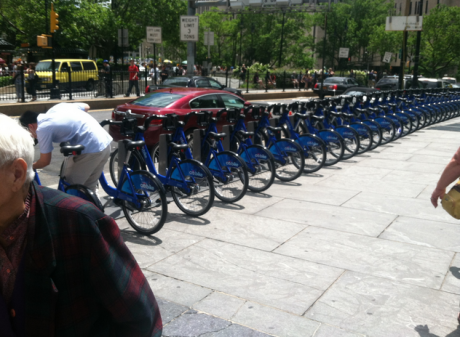I Tried New York’s Bike Share
Over the weekend, I tested New York’s weeks-old CitiBike bike share program. An unhealthy amount of my time was spent idling at intersections, bashfully deflecting the glowing attaboy stares I was getting from do-gooder Brooklynites. And the first station I tested—right at City Hall—was defective.
But amid all the distractions, I also made some mental notes about what Philly’s eventual bikeshare—due in the fall of 2014—could learn from New York’s.
- Skeptical New York taxpayers haven’t spent a dime. Citibank is bankrolling the implementation and rollout of New York’s program for at least the next five years, at a cost of $41 million; Mastercard bought the payment software. That’s why their logos are all over the place. While Michael Nutter is asking for $3 million from Council and another $5 million to $6 million from the state, the feds and private donations to kick off Philly’s bike share, he should seriously exhaust sponsorship options before doing so. (Citizens Bank, Wells Fargo?) The city’s broke, and compared to New York, many more of its residents are too. It’s going to be near-impossible for a lame-duck Nutter to ask overtaxed citizens to pick up the slack for an inherently yuppie goo-goo enterprise like bike share.
- Speaking of broke taxpayers. Philly’s bike share program has got to be way cheaper to use. A yearly membership in New York costs $95. Annual median income in New York is $56,000. Annual median income in Philadelphia is $37,000. To keep it proportional, Philly should charge about $60 a year instead.
- If bike share is going to work in downtown Philly—whose economy depends in large part on tourists—it needs to make the program very attractive to visitors. One of the biggest flaws with CitiBike is that for non-annual members, the only options are daily or seven-day subscriptions. Three-day passes, perfect for the Liberty Bell set, need to be available in Philly, as they are in D.C.
- CitiBike features little safety-reminder signs like these.
That’s all well and good, and I haven’t seen it anywhere else yet. But let’s go a step further, and install helmet-dispensing machines, as Boston is.
- CitiBike completely ignores Queens, the Bronx, Staten Island, and all of Manhattan north of 59th Street—including Harlem and other poorer areas of the upper part of the island. If Philly, with a much smaller downtown and a cluster of poorer neighborhoods relatively close to Center City, ignores those populations, its bike share will suffer from underuse.
- New York offers discounted annual CitiBike memberships for two-thirds the cost. But only those who live in public housing get to use it. That’s not a ton of people, and that’s not a heck of a discount, either. In Boston, meanwhile, anyone who proves they are low-income, receives any form of government assistance, or lives in public housing, gets a membership for $5 a year. Again, to get Philly’s comparatively poorer population to use bike share, that’s more like it.
- After four hours of CitiBiking—from Manhattan to Brooklyn and back again—I never once got “dockblocked.” Dockblocking, which happened to me all the time when I lived in D.C. last year, is the enraging experience of arriving at a station only to find all the spots filled. New York has helped ensure that rarely happens by building twice as many ports as bikes. Philly should do the same.
- The issue I had with a defective dock at City Hall was not an isolated one. Alta, the system operating CitiBike—which also runs the programs in D.C. and Boston—is experiencing some serious bugs in New York. If that persists, and Philly ultimately can’t cobble together the money for the standard-bearer Alta bikes, it might want to consider an alternate model debuting in Hoboken, New Jersey this summer. “Social Bicycles” can be parked at regular bike racks within the system’s boundaries; they’re tracked using portable locks that double as computer pads on which users can rent the bikes.
The system ain’t perfect, but neither is Philly—whatever bike share it chooses, I have a sneaking suspicion the city’s fall 2014 roll-out date might be a tad optimistic.



